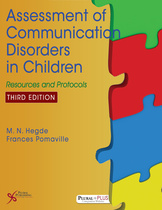Publication
Assessment of Communication Disorders in Children
Resources and Protocols
- Third Edition
- Details:
- 571 pages, Illustrated (B/W), Softcover, 8.5 x 11" 1 lbs
- Included Media:
- Companion Website
- ISBN13:
- 978-1-59756-784-8
- Release Date:
- 11/01/2016
Overview
Assessment of Communication Disorders in Children: Resources and Protocols, Third Edition offers a unique combination of scholarly information, invaluable resources, and time-saving protocols on assessment of communication disorders in children.
Most resource books offer limited research and scholarly information, thus making them unsuitable as textbooks for academic courses on assessment and diagnosis. Similarly, most traditional textbooks do not include practical, easy-to-use, and time-saving resources and protocols that the practicing clinicians can readily use during assessment sessions. By combining the strengths of traditional textbooks with newer assessment resources and protocols, this one-of-a-kind book offers a single, comprehensive source that is suitable as a textbook and useful as a practical clinical resource.
This bestselling and trusted text:
- Covers the full range of communication disorders in children, including nonverbal or minimally verbal children
- Includes an extensive discussion of issues in using standardized tests along with detailed information on psychometric principles and offers a detailed discussion of alternative assessment approaches that minimize the problems inherent to standardized tests
- Describes a new, comprehensive, and integrated assessment approach that derives its strengths from the traditional as well as several alternative approaches
- Addresses the multicultural issues in assessing communication disorders in children and integrates multicultural assessment procedures into the assessment protocols offered for all communication disorders
- Contains two chapters for each disorder: one on resources that offers scholarly and research background on the disorder and one on resources that describe practical procedures and protocols that save preparation time and effort for the clinician
New to the Third Edition:
- A PluralPlus companion website allows clinicians to view, modify, and print the assessment protocols for their personal use
- All Resources chapters reflect current research and assessment principles and procedures
- Updated listings and descriptions of published, standardized tests that are commonly used in the assessment of communication disorders in children are provided
- Revisions of several assessment procedures and protocols, based on recent research, are included
- A single streamlined chapter combines research and practical information on assessing ethnoculturally diverse children with alternative and integrated assessment approaches
- Each chapter contains a summary and sample study questions
RELATED BOOK ON ADULTS
This book is a companion volume to Assessment of Communication Disorders in Adults, Second Edition. These two volumes offer a comprehensive set of resources and protocols to assess the entire range of communication disorders in all age groups.
Reviews of the Second Edition
- Stephen Oller, Texas A&M University- Kingsville, (2013):
- "It's the best text currently available on the subject."
- Doody's, (2013):
- "Named to Doody's Core Titles in the Health Sciences 2013 list."
- Tracey Marsh, Leeds Metropolitan University, (2013):
- "I am delighted with this text, and will be able to make excellent use of it in my teaching...I am finding [it] invaluable."
Review
Doody's (May 2018):
"Named to Doody's Core Titles in the Health Sciences - Speech, Language & Hearing 2018 list."
Preface
Creating Child-Specific Assessment Packages with Protocols on the Companion Website
Part I. Foundations of Assessment
Chapter 1. Assessment of Communication Disorders in Children
Chapter 2. Common Assessment Protocols
Chapter 3. Standardized Assessment
Chapter 4. Alternative and Integrated Assessment
Part II. Assessment of Speech Sound Production
Chapter 5. Assessment of Speech Sound Production: Resources
Chapter 6. Assessment of Speech Sound Production: Protocols
Part III. Assessment of Language Skills in Children
Chapter 7. Assessment of Language Skills in Children: Resources
Chapter 8. Assessment of Language Skills: Protocols
Part IV. Assessment of Fluency
Chapter 9. Assessment of Fluency Disorders: Resources
Chapter 10. Assessment of Fluency Disorders: Protocols
Part V. Assessment of Voice
Chapter 11. Assessment of Voice: Resources
Chapter 12. Assessment of Voice: Protocols
Part VI. Assessment of Nonverbal and Minimally Verbal Children
Chapter 13. Assessment of Nonverbal and Minimally Verbal Children: Resources
Chapter 14. Assessment of Nonverbal and Minimally Verbal Children: Protocols
Chapter 15. Assessment for Augmentative and Alternative Communication Systems
Part VII. Literacy
Chapter 16. A Primer on Literacy Assessment
Index
About The Authors
M.N. Hegde, PhD, is Professor Emeritus of Speech-Language Pathology in the Department of Communicative Disorders at California State University, Fresno. A highly regarded author in speech-language pathology, his books include leading texts in academic courses and valuable resources for clinicians. His books have been used in worldwide in speech-language pathology programs.
A speech-language pathologist for over 20 years, Frances Pomaville, PhD, is an Assistant Professor in the Communicative Disorders and Deaf Studies Department at California State University, Fresno. She teaches undergraduate and graduate level courses in the areas of diagnostic procedures, anatomy and physiology, fluency, voice, traumatic brain injury, and dysphagia. She also supervises graduate students in their clinical practicum.
Related Titles
Here's How to Treat Childhood Apraxia of Speech
446 pages, Illustrated (B/W), Softcover, 8.5 x 11"
Child and Adolescent Communication Disorders
Edited by: Marie R. Kerins
472 pages, Illustrated (B/W), Softcover, 7 x 10"
Effective SLP Interventions for Children with Cerebral Palsy
Edited by: Fran Redstone
400 pages, Illustrated (B/W), Softcover, 6 x 9"
Oral-Facial Evaluation for Speech-Language Pathologists
480 pages, Color Illustrations (2 Color), Softcover, 8.5 x 11"
Assessing Listening and Spoken Language in Children with Hearing Loss
Edited by: Tamala S. Bradham, K Todd Houston
496 pages, Illustrated (B/W), Softcover, 7 x 10"
Purchasers of this book receive complimentary access to the assessment protocols hosted on a PluralPlus companion website.
Materials:
- Protocols and activity pages
To access the protocols, log in to the website using the URL and Access Code located inside the front cover of your copy of Assessment of Communication Disorders in Children: Resources and Protocols, Third Edition.














